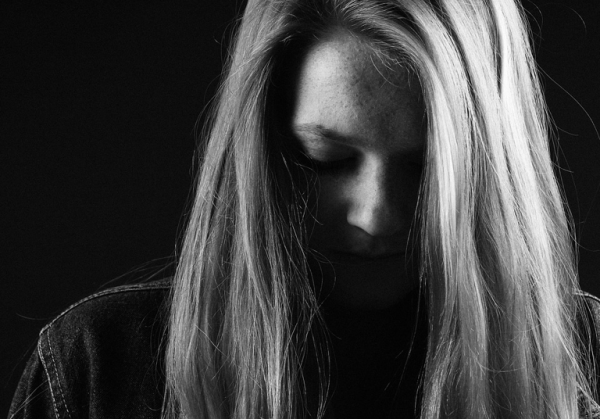As sufferers will know all too well, sleep problems and depression often go hand-in-hand. In this post, I summarise the findings of our recent paper investigating the role of genetic factors in underpinning this link.
Melanie Schneider (@mel_n_schneider)
Goldsmiths, University of London
It’s hardly news that if you are experiencing depression this might also affect your sleep and you are more likely to experience suffer from insomnia1,2,3. Vice versa, not sleeping well makes it more likely that you will develop depression too1,2,3.
There are various possible explanations as to why there is a link between the two problems. It could be that these traits overlap because they both relate to the issue of getting easily aroused4 or reacting emotionally5. It is also possible that our neural structure plays a role here6,7, and not sleeping well may influence how our brain responds to threats and how depressed we feel8,9. It also seems that the link between not sleeping well and depression continues over time. Research suggests that your experience of depression or sleep problems in the future is to some extent associated with how you feel and sleep today10,11.
What role do our genes play in all of this?
We know that insomnia is influenced by our genes and the estimates of genetic influence vary12. For depression, our genes play a role as well, and it too is moderately heritable13,14,15. In trying to understand the known links between sleep problems and depression, one question is, to what extent do genes explain this association today and also later in life?
How can this question be tackled?
Using a twin sample, our recent study has explored exactly this question16. We asked our participants questions at two separate time points which allowed us to draw conclusions about the associations between sleep problems and depression over time. Using the G1219 twin and sibling data set, we were able to analyse the data of 1556 individuals who provided information about their insomnia and depression symptoms when they were in their early twenties and of 862 of them again later, when they were in their mid-twenties17.
What did we find out?
As expected, we found that genes do play a moderate role in insomnia and depression symptoms when considered separately. It also turned out that the same genes that influence insomnia symptoms in the early twenties also influenced insomnia symptoms in the mid-twenties, which tells us that genes are involved in the persistence of this problem over time. And considering the persistence of depressions symptoms over time, roughly three quarters where explained by genetic factors. Lastly, we investigated how genes that influence your insomnia and depression symptoms today may affect how you feel or sleep in the future. It turned out that the link between insomnia symptoms in the early twenties and depression in the mid-twenties is largely explained by genetic influence, and environmental factors seem to be less important. Also, the relationship between depression symptoms in the early twenties and insomnia in the mid-twenties is mainly explained by genetic factors, with only a minor influence of non-shared environment.
What does that mean for you?
So you might wonder, if genes are so important, is there anything you can do to improve things? Of course you can! As your feelings and sleep today may be associated with your feelings and sleep in the future, it might be important to get help sooner rather than later. Even if genes are important in the association between insomnia and depression symptoms, we are not slaves to our genes18 and we can get better. There are successful treatments for these disorders, such as Cognitive Behavioural Therapy for Insomnia19.
Where do we go from here?
If you wonder what the future might bring after those findings, one the next step is to try to identify the specific genes involved in insomnia symptoms and depression symptoms, as well as in the association between the two20. Progress has been slow and there is a long way to go. Until then, try to be happy and get some good sleep!
Cited references:
- Alvaro PK, Roberts RM, Harris JK. A systematic review assessing bidirectionality between sleep disturbances, anxiety, and depression. Sleep 2013;36:1059-68.
- Baglioni C, Battagliese G, Feige B, et al. Insomnia as a predictor of depression: A meta-analytic evaluation of longitudinal epidemiological studies. J Affect Disord 2011;135(1-3):10-9.
- Lovato N, Gradisar M. A meta-analysis and model of the relationship between sleep and depression in adolescents: Recommendations for future research and clinical practice. Sleep Medicine Reviews 2014;18:521-9.
- Staner L. Comorbidity of insomnia and depression. Sleep Medicine Reviews 2010;14(1):35-46.
- Baglioni C, Spiegelhalder K, Lombardo C, Riemann D. Sleep and emotions: A focus on insomnia. Sleep Medicine Reviews 2010;14(4):227-38.
- Prather AA, Bogdan R, Hariri AR. Impact of sleep quality on amygdala reactivity, negative affect, and perceived stress. Psychosom Med 2013;75:350-8.
- Yoo SS, Gujar N, Hu P, Jolesz FA, Walker MP. The human emotional brain without sleep – a prefrontal amygdala disconnect. Current Biology 2007;17:R877-R878.
- Muzur A, Pace-Schott EF, Hobson JA. The prefrontal cortex in sleep. Trends in Cognitive Sciences 2002;6:475-81.
- Hariri AR. Looking inside the disordered brain. Sunderland, MA: Sinauer, 2015.
- Gregory AM, Buysse DJ, Willis TA, et al. Associations between sleep quality and anxiety and depression symptoms in a sample of young adult twins and siblings. J Psychosom Res 2011;71(4):250-5.
- Gillespie NA, Gehrman P, Byrne EM, Kendler KS, Heath AC, Martin NG. Modeling the direction of causation between cross-sectional measures of disrupted sleep, anxiety and depression in a sample of male and female Australian twins. Journal of Sleep Research 2012;21(6):675-83.
- Gehrman PR, Byrne E, Gillespie N, Martin NG. Genetics of insomnia. Sleep Medicine Clinics 2011, 6(2):191-202.
- Levinson, Douglas F. The genetics of depression: a review. Biological psychiatry 2006, 60(2):84-92.
- Sullivan PF, Neale MC, Kendler KS. Genetic epidemiology of major depression: review and meta-analysis. American Journal of Psychiatry 2000, 157(10):1552-1562.
- Kendler KS, Gatz M, Gardner CO, Pedersen NL. A Swedish national twin study of lifetime major depression. American Journal of Psychiatry 2006, 163(1):109-114.
- Gregory AM, Rijsdijk FV, Eley TC, Buysse DJ, Schneider MN, Parsons MJ, Barclay NL. A longitudinal twin and sibling study of associations between insomnia and depression symptoms in young adults. Sleep 2016, 39(11):1985-92.
- McAdams TA, Gregory AM, Rowe R, et al. The genesis 12-19 (G1219) study: A twin and sibling study of gene-environment interplay and adolescent development in the UK. Twin Research and Human Genetics 2013;16:134-43.
- Plomin R, DeFries JC, Knopik VS, Neiderhiser JM. Behavioral Genetics. 6th ed. New York: Worth Publishers, 2013.
- Brasure M, et al. Psychological and Behavioral Interventions for Managing Insomnia Disorder: An Evidence Report for a Clinical Practice Guideline by the American College of Physicians Psychological and Behavioral Interventions for Managing Insomnia Disorder. Annals of internal medicine, 2016;165(2):113-124.
- Parsons MJ. On the genetics of sleep disorders: genome-wide association studies and beyond. Advances in Genomics and Genetics 2015;5:293-303.



